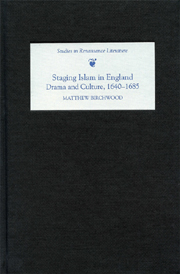Book contents
- Frontmatter
- Contents
- List of illustrations
- Acknowledgements
- Introduction
- 1 Cultural Encounters between England and Islam in the Seventeenth Century: A Topography
- 2 Framing ‘an English Alchoran’: The Famous Tragedie of Charles I and the first English translation of the Qur'an
- 3 Orienting the Monarch: Tyranny and Tragedy in Robert Baron's Mirza and John Denham's The Sophy
- 4 Turning to the Turk: Collaboration and Conversion in William Davenant's The Siege of Rhodes
- 5 Toleration, Trade and English Mahometanism in the Aftermath of Restoration
- 6 Plotting the Succession: Exclusion, Oates and the News from Vienna
- Conclusion: ‘If we our selves, would from our selves exam'ne us’
- Bibliography
- Index
- Studies in Renaissance Literature
1 - Cultural Encounters between England and Islam in the Seventeenth Century: A Topography
Published online by Cambridge University Press: 12 September 2012
- Frontmatter
- Contents
- List of illustrations
- Acknowledgements
- Introduction
- 1 Cultural Encounters between England and Islam in the Seventeenth Century: A Topography
- 2 Framing ‘an English Alchoran’: The Famous Tragedie of Charles I and the first English translation of the Qur'an
- 3 Orienting the Monarch: Tyranny and Tragedy in Robert Baron's Mirza and John Denham's The Sophy
- 4 Turning to the Turk: Collaboration and Conversion in William Davenant's The Siege of Rhodes
- 5 Toleration, Trade and English Mahometanism in the Aftermath of Restoration
- 6 Plotting the Succession: Exclusion, Oates and the News from Vienna
- Conclusion: ‘If we our selves, would from our selves exam'ne us’
- Bibliography
- Index
- Studies in Renaissance Literature
Summary
WHEN NEWS OF THE Death of James I reached the sublime Porte, Sultan Murad IV formally conveyed his condolences to the English residency there in what Sir Thomas Roe describes as ‘a civility and honour never formerly used to any Christian prince’. Roe, English ambassador at Constantinople between 1621 and 1628, had adroitly managed English affairs, renegotiating a favourable trade agreement (the so-called ‘capitulations’), and winning the gratitude of the Levant Company and the esteem of his Ottoman hosts. Notwithstanding the celebrated (and chiefly rhetorical) zeal of his sovereign against the ‘infidel Turk’, Roe had overseen a period of mutually lucrative cooperation between the two nations: by 1626 the Levant Company was exporting £250,000 of goods per annum, reciprocated by an equally valuable amount of imports. Whilst frequently interfering with the affairs of the Company, however, it seems that Charles was content to leave direct diplomatic representations to his official envoys, that is until 1642.
We understand by Our Embassadour Resident with You, with how much Honour and respect, the death of Our dear Lord and Father (of ever glorious memory) was condoled at your Imperiall Port : and if the signification thereof, and of Our peacable succession to these Crownes, have not in all this time come unto you immediately from Our self, it hath not been through any default of Our affection, or respect to You, but many important affairs upon Our first Access, and the dangerous troubles wherewith Our City of London and many other principall parts of our Kingdome have been (and at this time are) infected with; have diverted Us, and forced Us to defer these offices longer than we intended or desired; and as we hope You will : For these important Reasons, readily and freely execute those omissions which in so weighty occasions may well be dispersed withal.
- Type
- Chapter
- Information
- Staging Islam in EnglandDrama and Culture, 1640–1685, pp. 21 - 51Publisher: Boydell & BrewerPrint publication year: 2007

